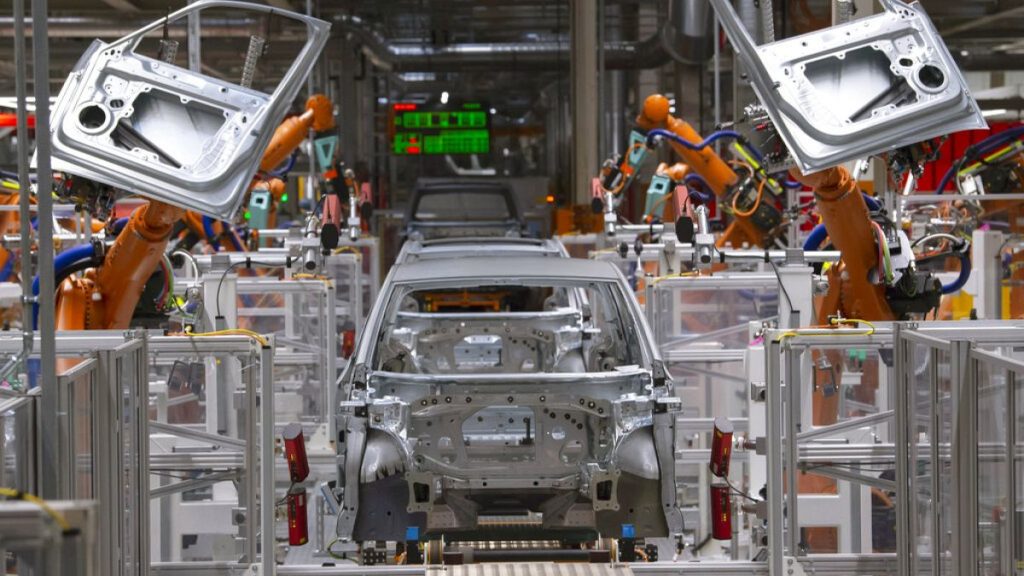The European automotive industry is facing a renewed crisis, marked by declining demand, increased competition from China, and the ongoing challenges of transitioning to electric vehicle production. This downturn is impacting the Portuguese automotive sector, particularly its component manufacturing industry, which is heavily reliant on exports to the European market. Portugal’s automotive component industry plays a significant role in the European supply chain, with nearly every car in circulation on the continent containing at least one Portuguese-made part. This deep integration makes the Portuguese industry highly vulnerable to fluctuations in European car sales. As demand slows across Europe, with plant closures and job losses reported in major automotive manufacturing hubs like Germany and Belgium, Portuguese component manufacturers are bracing for a significant hit to their exports and overall production.
The anticipated decline in Portuguese automotive component exports is expected to manifest in the final months of 2023. While October saw a modest year-on-year growth of 2.6%, industry experts predict a contraction of between 4% and 5% for November and December. This projected decline underscores the gravity of the situation and the potential for significant economic consequences for the Portuguese economy. The sector, comprising around 350 companies and employing 64,000 people, achieved a turnover exceeding €14 billion in 2023. However, maintaining this level of employment and economic activity appears increasingly challenging given the unfavorable market conditions. The potential job losses represent a significant concern for the Portuguese economy and highlight the vulnerability of a sector deeply embedded in the global automotive supply chain.
The downturn in the European automotive market stems from a confluence of factors, including a general economic slowdown, the complexities of the transition to electric vehicles, and the growing dominance of Chinese manufacturers. The EU’s ambitious target of phasing out combustion engine vehicles by 2035, while environmentally laudable, presents significant challenges for European manufacturers. The high cost of electric vehicles, coupled with inadequate charging infrastructure, has hampered consumer adoption, creating a drag on demand. Simultaneously, Chinese manufacturers, with their advanced battery technology and competitive pricing, are rapidly gaining market share, exacerbating the pressures on European automakers.
The contrasting fortunes of the Portuguese domestic car market and the European market further complicate the situation. While sales in Portugal have shown modest growth of around 4% compared to the previous year, they remain below pre-pandemic levels. This relatively stable domestic demand offers limited respite for Portuguese component manufacturers, whose primary market remains the faltering European market. The divergence between domestic and European trends highlights the industry’s dependence on exports and the limited ability of the domestic market to offset the broader European downturn. This underscores the need for the Portuguese automotive sector to diversify its markets and explore opportunities beyond Europe to mitigate the impact of future downturns in the European market.
Industry leaders in Portugal voice concerns about the EU’s regulatory framework for emissions, arguing that it places European manufacturers at a competitive disadvantage compared to their counterparts in the US and China. They contend that the stringent European regulations increase production costs, making it harder to compete with manufacturers in regions with less stringent environmental standards. This perceived “unfair competition” further complicates the transition to electric vehicles and adds to the pressures on the European automotive industry. Experts advocate for strategic investments in training and development to enhance the competitiveness of the European automotive workforce and enable the industry to effectively compete in the rapidly evolving global market.
The future of the Portuguese automotive component industry hinges on several factors, including the pace of the European economic recovery, the success of the transition to electric vehicles, and the ability of European manufacturers to compete with Chinese rivals. Sustaining the current level of employment in the sector appears unlikely given the anticipated decline in production and exports. The industry needs to adapt to the changing market dynamics, potentially through diversification of markets, investment in new technologies, and a focus on upskilling the workforce to meet the demands of the evolving automotive landscape. A strategic response that addresses these challenges is crucial to ensure the long-term viability and competitiveness of the Portuguese automotive component industry.














